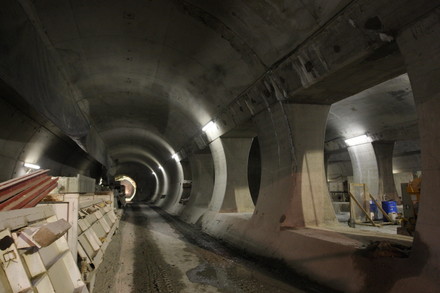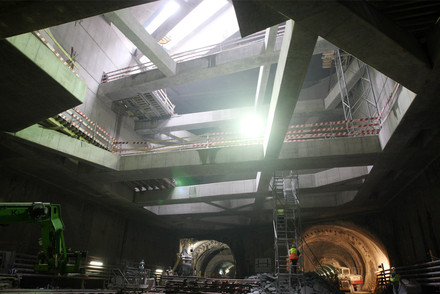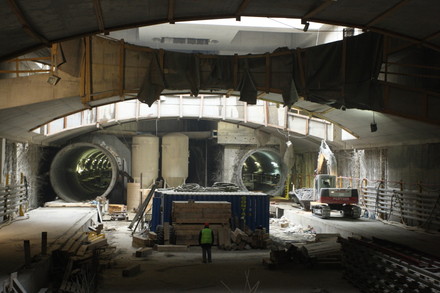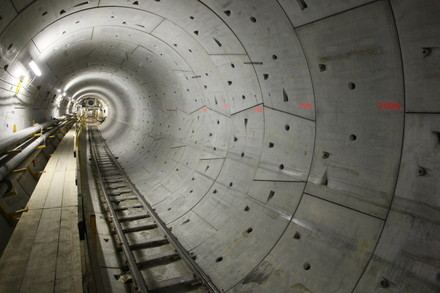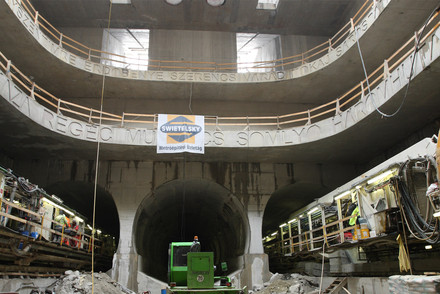Moscow Metro seeks funding for the future
By Konstantin Rozhnov Business reporter, BBC News
The Moscow Metro system, one of the busiest in the world, celebrates its 75th anniversary on Saturday.
http://news.bbc.co.uk/2/hi/business/10115523.stm
With more than 6.5 milllion passenger journeys a day on average in 2009, it still manages to operate like clockwork.
Despite being praised for the punctuality and short intervals between trains, the Moscow Metro is often criticised by commuters for being heavily overcrowded.
"It is the first underground system in the world that has encountered the problem of traffic jams," says Valery Mnatsakanov, director general of Tomak Ltd and an expert in the Russian capital's Tube system.
But the Moscow Metro's financing and development story is not unique, when compared with its counterparts in other parts of the world, including the London Underground.
Passenger money
Moscow Metro chief Dmitry Gayev says the underground system aims to catch up with the city's development scale by 2020.
According to Mr Gayev, the Moscow Metro made an operating profit of "a bit more than 1bn roubles" ($33.4m, £22.6m) in 2009.
THE MOSCOW METRO
* Opened in 1935
* 180 stations
* 12 lines
* 2.4bn passengers in 2009
* 4,535 carriages (3,557 in operation)
* Trains on time: 99.98%
Source: Moscow Metro
Revenue from fares, which is the main source of money for most Tube systems, accounts for up to 70% of all the Moscow underground's income. The rest comes from state subsidies and other commercial activities.
Transport expert Christian Wolmar, author of the book Down the Tube, told the BBC that the London Underground, with 3.5 million passenger journeys a day, would probably also be able to make annual profits, if it had no need for improvement works.
The difference, though, is that the cost of a ticket in London is much higher than in Moscow, despite the Russian capital being more expensive in many other ways.
THE LONDON UNDERGROUND
* Opened in 1863
* 270 stations
* 11 lines
* 1bn passengers in 2008/2009
* 4,070 carriages
* Trains on time: 96.4%
Source: Transport for London
There are no zones in the Moscow Metro and a standard single trip would cost you 26 roubles (60 pence), while a single trip in central London costs £1.80 if you have an Oyster card, or much more with a paper ticket.
London Underground, the operator of the London Tube system and part of the state-run Transport for London (TfL) corporation, generated revenue from fares of £1.6bn in the 2008/09 financial year, while total revenue reached £1.8bn.
At the same time, operating expenses amounted to £2.2bn, while capital works undertaken on the London Underground stood at £1.6bn.
Investing in future
These figures are higher than the amount the Moscow Metro gets to build new stations and tracks.
However, Mr Gayev stresses that the London Underground is 1.6 times larger than the Moscow one.
There are 270 tube stations in operation in London, while in Moscow there are 180 of them.
Mr Gayev says the Moscow Metro needs to build 50-70bn roubles' worth of new stations and tracks annually to be able to catch up with the Russian capital's development scale by 2020.
In 2008, the Moscow local government paid 41.6bn roubles to finance the Metro expansion, while the Russian Finance Ministry provided 3.2bn roubles.
But according to Mr Gayev, the city government is now the sole contributor.
Tube v cars
Many experts believe that the Moscow Metro needs much more money than it gets to satisfy the needs of the Russian capital.
RUSSIA BUSINESS REPORT
Mr Mnatsakanov, whose company came up with a brand-new approach to underground system construction, thinks that "cars, not the Metro, have the greatest influence on the way officials think".
Huge Moscow traffic jams have forced the Moscow government to start constructing a fourth ring road around the city.
But Mr Mnatsakanov said that while the road was a good idea, it should be accompanied by building Tube lines along it, as the underground service can carry many more people than a highway.
In the Moscow Metro, unlike in London, maintenance works never entail the closure of entire lines.
Mr Gayev says Moscow cannot afford such closures, so all works have to be done at night.
And while London and New York can replace the closed lines with alternative services, such as substitute buses, that is not the case in the Russian capital, as the Moscow Metro carries 60% of all Muscovites who use public transport.
Ownership
As there is virtually no public transport alternative to the underground system in Moscow, those who would love to see the Metro partly privatised find it difficult to promote their ideas.
They say that the influx of private capital would give the underground system the necessary money for faster expansion.
The Moscow Metro The Moscow Metro is famous for the museum-like looks of its stations
The Moscow Metro has never had any injection of private capital, unlike the London Underground.
A public-private partnership (PPP) deal to upgrade the London Tube network was created several years ago.
Two private companies were made responsible for its maintenance and improvement. However, one of the two firms went into administration in 2007, while the deal with the other one ended earlier this month.
Mr Wolmar believes that the PPP was not an efficient way to run the Tube. The demise of the deal might result in fewer line closures and money could be better spent, he argues.
Mr Gayev said that the best possible way to operate and develop an underground system always depends on the economic situation and current needs of the city.
"Globally, there is a practice when some companies are privatised, then bought back by the state, then privatised again - it is quite a dynamic form of development," he said.
The Moscow Metro, opened in 1935, differs from most other underground systems, thanks to the museum-like looks of its stations.
But many problems it faces are common to all the Tubes around the world and mostly have to do with finding money for maintenance and development projects.
Meanwhile, the opening of two new stations on the anniversary day on Saturday has reportedly been postponed.
Clearly the Moscow Metro has to celebrate its history on the occasion of its 75th birthday, but it also needs better planning for the future.



